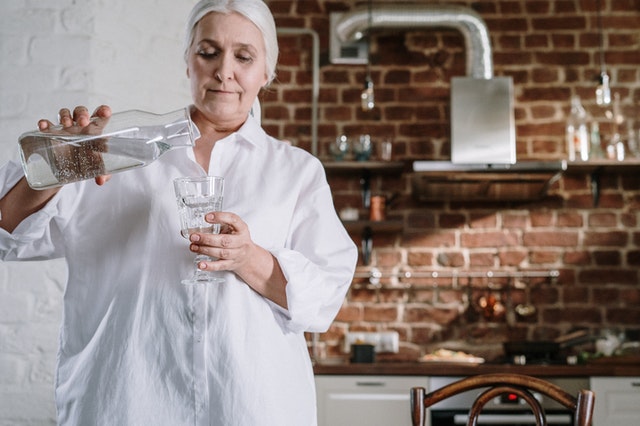Many dieticians and nutritionists believe people often require more water than they get, even following federal guidelines — eight glasses per day. According to Sarah Krieger, a registered dietician nutritionist, a more accurate or adequate model is to take half of your body weight and drink that in ounces, meaning a 140-pound individual would drink 70 oz.
The National Academies of Sciences, Engineering, and Medicine makes the process even easier, recommending men drink a minimum of 13 cups of fluids per day and women drink nine or more. In other words, men should aim for 104 oz. and women for 72 oz.
How do you fit all that liquid into your day? First, pay attention to the wording. The suggestion is for fluids, not just water. However, it is crucial to up your water intake, and that is a straightforward process when you know the most optimum times to drink.
Wake-Up

Many people do not realize they wake up in the morning already dehydrated. You do not drink for the eight hours you are asleep. Therefore, help your body replenish itself by drinking one to two cups of water when you wake, eight to 16 ounces.
Once you have one or two cups, feel free to make yourself a cup of coffee. Coffee also counts toward your fluid intake for the day.
Pre-Meal, Mealtime, and Post-Meal

Many studies suggest that drinking water can help regulate and mitigate hunger. Therefore, many experts recommend having a cup of water before, during, and after a meal.
By drinking a glass of water before your meal, you effectively lubricate your insides, which will ultimately help with digestion. However, you also prefill your stomach, meaning you are less likely to overindulge during the meal.
Drinking water during your meal will also help with digestion. It also provides lubrication for your throat, making it easier to swallow food.
Finally, drinking a cup of water after a meal ensures optimal digestion and helps reduce the risk of sudden hunger pangs. Therefore, drinking water in this way ensures you stick to a meal plan and avoid consuming empty calories between meals.
Midafternoon Slump

It is natural to feel a bit of a slump around 3:00 pm. While this slump often results in the afternoon consumption of coffee, it is best to stay away from caffeinated beverages. Consuming caffeine late in the afternoon can affect sleep later.
What most people do not realize is that slumps can stem from dehydration. Dehydration can also result in irritability, hostility, confusion, etc. Therefore, it is best to help your body stay steady and alert by consuming more water.
Pre-Workout, Workout, and Post-Workout

Do you workout before or after work? Regardless of when you exercise, drinking water is a crucial component of your routine.
While you will want to drink water before your routine, make sure you allow your body enough time to process the fluid. Drinking a cup of water immediately before hopping on a treadmill will likely result in bloating and discomfort. Instead, drink a cup of water 30 minutes before you begin.
You will also want to hydrate during your workout. However, do not gulp water. Take sips. Drink slowly during your routine to prevent getting sick or feeling uncomfortable.
Bedtime

You should also bring a glass of water to bed, only taking a couple of sips before lying down. Too much water before bed will lead to sleep disruptions.
Are you an avid water drinker? Share your tips for staying hydrated throughout the day.


Most of this information is good, however your other sources are misleading and incorrect. Drinking at times you suggest is smart, however drinking during and after meals is unwise because the water, especially cold water dilutes your important digestive enzymes so they can’t perform their tasks sufficiently and you’re left with a lot of un digested food that putrefies in your intestines until it can evacuate.. Drinking a small amount of room temperature water for getting down supplements and having warm soups is ok. Coffee is acidic and dehydrating, as anything that’s roasted to a dark color, and creates acrylamides also which are carcinogens and age us (dark spots on your skin means more dark spots on your insides). I only eat lightly roasted nuts, grains, etc. and only on low flame on the stove or oven; so much better for you.